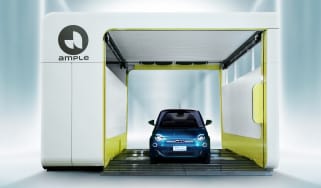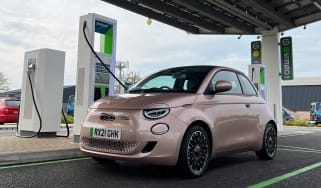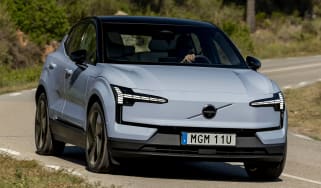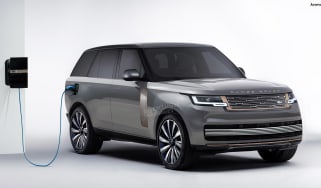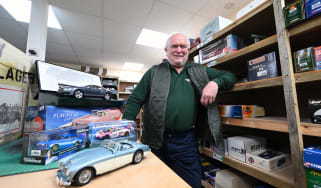UK 2035 petrol and diesel ban: what is it and what cars are affected?
The ban on new petrol and diesel car and van sales in the UK has been delayed to 2035 - here’s everything you need to know
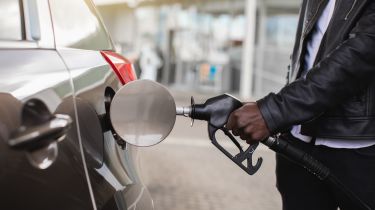
All new petrol and diesel-powered cars and vans are set to be banned from sale in the UK in 2035, following a government move to postpone the measure that was originally scheduled to come into effect in 2030.
The change of policy announced by Rishi Sunak brings the UK into line with the EU and many other global markets, and means that from 2035 the only new cars and vans that can be sold will be pure electric ones, plus any hydrogen-powered cars, that may exist at that point.
Second-hand cars will be unaffected by the ICE (internal combustion engine) ban, and may be bought and sold freely just as now. That means that very many older petrol and diesel cars, plus conventional hybrids and plug-in models, are likely to be in use long after the 2035 deadline for selling new ones.
Although the UK has yet to publish details of how the 2035 ban will work, it’s unlikely to differ much from the EU’s plan to ban the sale of petrol and diesel cars from 2035. That means we’re likely to see exemptions in place for low-volume or specialist manufacturers. However, while the EU intends to provide further exemptions for internal combustion engined cars powered exclusively by efuels, the UK government has so far made no plans to offer efuel exemptions here.
A further consideration for consumers and industry, is that all the major opposition parties to the Conservative government have pledged to reverse Rishi Sunak’s September 2023 change of policy, and revert to the original 2030 date for banning new petrol and diesel car sales. With a general election looming in 2024, and polls putting the Labour party ahead, it seems there’s plenty of scope for more change - and more uncertainty - in the months ahead.
Limited Government help for the electric car transition
To help facilitate the transition away from fossil-fuel cars in the UK, £1.3 billion of investment was announced in 2020 to fund EV chargepoints for homes, streets and motorways across England. A further £582 million was set aside for grants to help people and businesses into EVs and PHEVs. The Government is also investing in battery development and mass production, while more money was earmarked for nuclear power plants, partly to help meet the demand for electricity the growing number of EVs will bring.
However, even though car makers will be mandated by law to sell increasing numbers of EVs - starting at 22 per cent of their total sales in 2024 and rising to 80 per cent by 2030 - or face financial penalties, the government has so far resisted industry calls to incentivise EV buyers with taxpayers’ cash.
Since the government withdrew the UK plug-in car grant in 2022, there have been no financial incentives offered to private buyers of EVs. Meanwhile, company car buyers are offered major benefit-in-kind benefits if they choose an EV over a petrol or diesel alternative, a state of affairs which has led to booming EV registrations by fleet users, while demand for EVs among private buyers has fallen back.
Background to the petrol and diesel ban: how we arrived at 2035
A ban on the sale of new petrol and diesel cars was first announced by then-environment secretary, Michael Gove, in 2017. Back then, the date was set for 2040 and, after several clarifications, it emerged any new car with any kind of internal combustion engine would be banned from sale by that date.

The shifting sands of future policy saw a consultation launched in 2020 to investigate if a ban in 2035, "or earlier if a faster transition appears feasible” should be introduced, with hybrids included in the proposals. Both 2035 and an earlier date were clearly deemed 'feasible' by the Government following that review and the 2030 date was announced in 2020, with some wiggle room for plug-in hybrids with 'significant' electric range. Rishi Sunak’s government, faced by the cost of living crisis and the prospect of a voter backlash, chose to reset the government’s net zero strategy to 2035.
The ban on petrol and diesel cars is part of a wider £12 billion ‘Green Industrial Revolution’ that the Government hopes will create 250,000 jobs as the country invests more in battery technology, carbon capture, and green energy. The UK’s “industrial heartlands, including in the North East, Yorkshire and the Humber, West Midlands, Scotland and Wales”, will be key to the coming changes, with 50,000 jobs, and £1 billion of investment in “areas such as the Humber, Teesside, Merseyside, Grangemouth and Port Talbot” alone.
Your petrol and diesel ban questions answered
What should I do about the ban?
It’s a tricky time for consumers to make decisions about their car ownership situation. Not only are there the aforementioned changes to what cars are going to be available to buy new in the coming years, but other factors – including the cost of living crisis, supply-chain issues and inflated prices – also come into play.
Making the leap to an electric car will certainly make sense for some drivers. If you can afford to pay the premium and don’t travel longer distances on a regular basis, then there is a great range of highly desirable options for you to choose from. Beneficial Vehicle Excise Duty and company car tax rates haven’t been snuffed out quite yet, and the same goes for exemption to the London congestion charge – although these things will change in 2025.
Buying a new petrol or diesel car while you still have the chance to do so will appeal to many. And if you fit into this category, a brand-new ICE car will cost less than its electric equivalent, plus you won’t have to worry about the charging infrastructure, as you would with an electric vehicle, or clean-air zones as you might with an older car. There is no prospect of any kind of ban on the use or sale of existing petrol and diesel cars. The ban only applies to the sale of new models.
Of course, many of us don’t have the budget for a new car. It might be that you want to keep your old one going, but are worried about being affected by a clean-air zone. If so, the second-hand market is an option. Used electric cars are in more plentiful supply and modern petrol and diesel models will still avoid Ultra Low Emissions Zone charges.
Can I still drive a petrol and diesel car after 2035?
Yes. The bans on these dates only apply to sales of new cars, and there are no current plans to outlaw the use or sale of second-hand cars based on these criteria.
Electric cars are still too expensive, though. Will anything be done to bring prices down?
Electric cars are significantly more expensive than conventional ones at present, a situation that wasn't helped by the end of the UK plug-in car grant, but the difference is narrowing. It can be difficult for manufacturers to turn a profit on some EVs but Looking forward to the next decade, it’s possible that increased manufacturing volumes and economies of scale will see this improve and prices come down. We’re already seeing increased competition in the market and new brands arriving from China pushing the prices of EVs lower.

I don’t have off-street parking. How will I charge an electric car?
A number of solutions exist or are in development for this. Chargers that pop out from the kerb and lamp post chargers are two such options. Furthermore, as the number of electric vehicles in the country increases, so to will charging stations. Expect these to become more commonplace at supermarkets, pubs and restaurants, cinemas, leisure centres, and other locations over the next decade.
A change of mindset will also be required, with EV users highlighting the approach people take to charging their smartphones as being similar to topping up EVs: rather than always doing big overnight charges, for example, regular top-ups will keep people’s cars moving.
I cover above average mileages. Will my journeys take longer?
The average UK motorist drives around 21 miles a day, but many people do more. EV ranges are commonly increasing, however, with 200-300 miles from a single charge a realistic figure for many modern electric cars. Journeys of such length would typically bring with them pit-stops at motorway services, where fast charging can add a meaningful amount of range in as little as 30 minutes, and a £1.3 billion fund helping make such chargers more plentiful.
I’m a van driver. How will the ban affect me?
Vans, also known as light commercial vehicles, are also affected by the 2035 ban. Just as EV technology has developed rapidly for cars, so has it for vans. The new Ford E-Transit, for example, has a range of 217 miles, the same cargo capacity as its diesel counterpart. Expect more such vehicles over the next decade and, while electric vans are likely to be more expensive to buy than diesel models, running costs can be lower thanks to the lack of engines to service, and diesel tanks to fill up.
What about National Grid? Can the UK’s electricity supply cope with all these extra EVs?
Indications are that this will not be a problem. There are around 30 million petrol and diesel cars in the UK, but these will not be replaced overnight, and the phase-in of EVs will be gradual. Assuming new-car sales figures continue at their current pace of roughly two million a year, it’ll be 15 years before the UK’s petrol and diesel cars are replaced.
National Grid has previously stated that “enough capacity exists” for the transition to EVs, while its modelling predicts that even if all the UK’s cars became electric overnight, demand would only increase by 10 per cent.
What kind of car should you buy today? We examine the petrol, diesel, electric and hybrid options here...





